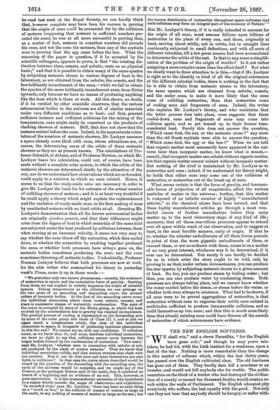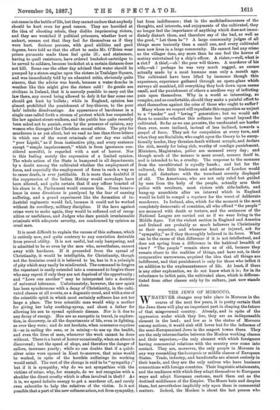THE NEW ENGLISH SOFTNESS.
" WE shall win," said a clever Parnellite, " for the English have gone soft;" and though he may prove mis- taken, he had hit, with the Irish instinct for a weakness, upon a fact of the day. Nothing is more remarkable than the change in this matter of softness which, within the last thirty years, has passed over the English cultivated class. The old hardness has gone out of them. They hardly dare kill a murderer or an invader, and would not kill anybody else for -worlds. The publics executiononthe block of a traitor who had destroyed the civilisa- tion of a county or caused ten thousand deaths, would create a re- volt within the walls of Parliament. The English educated pity everybody who suffers, the bad equally with the good. Not only can they not bear that anybody should be hungry, or suffer with- out cause in the battle of life, but they cannot endure that anybody should be hurt even for good reason. They are horrified at the idea of shooting rebels, they dislike imprisoning rioters, and they are wretched if political prisoners, whether hurt or unhurt, scream out that they feel for themselves as if they were hurt. Serious persons, with good abilities and good degrees, have told as that the effort to make Mr. O'Brien wear prison garments made them feel quite ill ; and statesmen, having to quell resistance, have ordered buckshot-cartridges to be served to soldiers, because buckshot at a certain distance does not kill. Some one the other day advised that water should be pumped by a steam-engine upon the rioters in Trafalgar Square, and was immediately told by an educated critic, obviously quite sincere, that the advice was harsh, because a water•douche in weather like this might give the rioters cold ! So gentle axe civilians in Ireland, that it is scarcely possible to carry out the law there, any crowd being allowed to defy it for fear some one should, get hurt by ballets ; while in England, opinion has almost prohibited the punishment of boy-thieves, to the poor lads' infinite disadvantage. An appearance of harshness in a single case called forth a stream of protest which has suspended the law against street-walkers, and the public has quite recently been asked not to punish, even by the pressure of opinion, any women who disregard the Christian sexual ethics. The pity for murderers is as yet silent, but we read no less than three letters in which one of the worst criminals of our day was called "poor Lipski," as if from instinctive pity, and every sentence except "simple imprisonment," which is from ignorance con- sidered merciful, is regarded with a sort of horror. Nor is this feeling merely the expression of a limited opinion. The whole action of the State is hampered in all departments by a doubt among the cultivated whether the employment of force, and especially the employment of force in such a way as to cause death, is ever justifiable. It is more than doubtful if the suppression of the Indian Mutiny would nowadays have been allowed, and quite certain that if any officer boasted of his share in it, Parliament would censure him. Even benevo- lence in some directions is paralysed by the fear of causing suffering, and a grand experiment like the formation of in- daetrial regiments would fail, because it could not be worked without its corollary, military discipline. If the laws against crime were to make again, they would be softened out of recog- nition or usefulness, and Judges who dare punish irreclaimable criminals with adequate severity, are condemned by opinion as cruel men.
It is most difficult to explain the causes of this softness, which is entirely new, and quite contrary to any conviction derivable from proved utility. It is not useful, but only hampering, and is admitted to be so even by the men who, nevertheless, cannot away with hardness. If it proceeded from the spread of Christianity, it -would be intelligible, for Christianity, though not the feminine creed it is believed to be, has in it a principle of pity which may easily be misdirected. The command to forgive the repentant is easily extended into a command to forgive those who may repent if only they are not deprived of the opportunity ; and "Love one another" may be interpreted into a doctrine of universal tolerance. Unfortunately, however, the new spirit has been synchronous with a decay of Christianity, in the culti- vated classes at all events, as a dogmatic creed, and with a rise of the scientific spirit in which most certainly softness has not too large a place. The true scientific man would whip a mother for giving her baby soothing-syrup, and shoot a father for allowing his son to spread epidemic disease. Nor is it due to any decay of energy. Men are as energetic in travel, in explora- tion, in discovery, in all the departments of life, even in fighting, as ever they were ; and do not hesitate, when commerce requires it—as in sailing the seas, or in mining—to use up the health, and even the lives of men, whenever the work cannot be done without. There is a burst of horror occasionally, when an abuse is discovered ; but the speed of ships, and therefore the danger of sailors, increases yearly ; while no one doubts that if a quick- silver mine were opened in Kent to-morrow, that mine would be worked, in spite of the horrible sufferings its working would entail. The root of the change is said to be "sympathy ;" but if it is sympathy, why do we not sympathise with the victims of crime, why, for example, do we not recognise with a shudder the direct cruelty which is often involved in theft ? As it is, we spend infinite energy to get a murderer off, and rarely even subscribe to help the relatives of the victim. Is it not possible that a part of the new softness arises, not from sympathy, but from indifference ; that in the multitudinousness of the thoughts, and interests, and enjoyments of the cultivated, they no longer feel the importance of anything which does not imme- diately disturb them, and therefore say of the bad, as well as the good, " Let them be "? A large community judges of all things more leniently than a small one, and every cultivated man now lives in a large community. He cannot feel any crime as the villager does, any more than he can feel the horror of mutiny entertained by a ship's officer. A rioter,—well, what ie a riot ? A thief,—oh 1 the poor will thieve. A murderer of his wife,—ah I perhaps he was very much nagged, an excuse actually made by a moat humane man only a month ago. The cultivated have been lifted by immense though thin experience, experience gathered through an opera-glass whibh surveys all mankind, till everything they look down upon seems small, and the punishment of others a needless way of inflicting pain upon themselves. Why in a world so interesting, so complex, and so comfortable, should they make a painful effort to steel themselves against the cries of those who ought to suffer?
Many whom we respect will repudiate this suggestion as unjust to a " tender " and " loving " generation ; but we would ask them to consider whether this softness has spread beyond the cultivated. So far as we can perceive, the uneducated are harder than ever, more inclined, instead of less inclined, towards a gospel of force. They ask for compulsion at every turn, and when they are Socialists, who ought upon the theory to be excep- tionally tender, they threaten death without scruple, and declare the rich, merely for being rich, worthy of condign punishment. Ministers, Magistrates, police are menaced every day ; and though much of the menace is mere sound, menace itself is, and is intended to be, a cruelty. The response to the menaces from the uncultivated is equally harsh ; and but for the cultured, the little tradesmen and artisans of London would treat all disturbers with the trenchant severity displayed of old. The Americans, who are not only ruled but guided by men from the body of the people, actually arm their police with revolvers, meet rioters with rifle-bullets, and hang-up anarchists after an interval which in England would be held to compel a reprieve for the worst of deliberate murderers. In Ireland, also, which for the moment is the most completely democratic of countries, all who offend "the people" are menaced with death or torture, and the sentences of the National League are carried out as if we were living in the Middle Ages. Yet the violent section in England and America and Ireland are probably as much believers in Christianity as their superiors, and whenever hurt or injured, ask for "sympathy," as if they thoroughly believed in its force. What can be the cause of that difference if it is not intellectual, and does not spring from a difference in the habitual breadth of view ? "The people" remain stern as of old, because they remain closer to the realities of things, and have not, in their comparative narrowness, acquired the idea that all things are indifferent, and that punishment is only for those who inflict it an addition to the unpleasantnesees of life. At least, if there is any other explanation, we do not know what it is ; for in its reluctance to inflict pain, the cultivated class, which is differen- tiated from other classes only by its culture, just now stands alone.











































 Previous page
Previous page